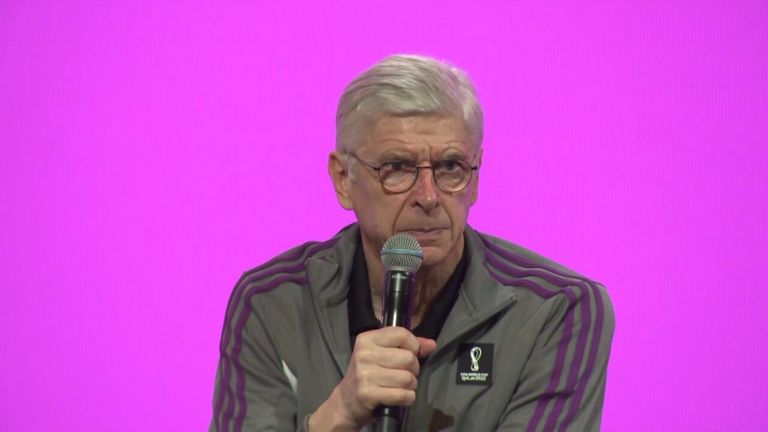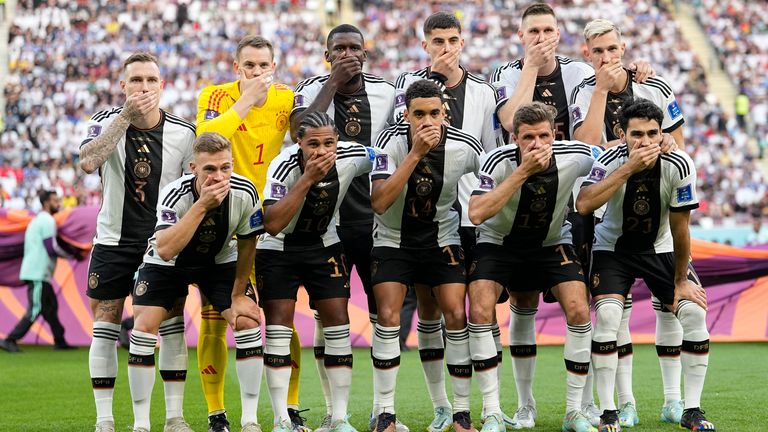Arsene Wenger suggests Germany lost focus in World Cup due to 'political demonstrations'
Germany, champions in 2014, were knocked out at the group stage for the second successive World Cup, having covered their mouths during their team photograph ahead of their opening match with Japan in protest against FIFA's ban on OneLove armbands
Sunday 4 December 2022 20:58, UK
Arsene Wenger has suggested Germany lost focus at the World Cup because of "political demonstrations", contributing to their exit at the group stage.
Germany, world champions in 2014, were knocked out of the group stage for the second successive World Cup, having covered their mouths during their team photograph ahead of their opening match against Japan in protest against FIFA's ban on OneLove armbands.
The gesture came after the German football association (DFB) told captain Manuel Neuer not to wear the rainbow armband for the game against Japan following FIFA's warning they would face "massive" sporting sanctions if he wore the armband, which promotes diversity and inclusion.
England, Wales, Netherlands and several other nations also did not wear the armband.
Germany did not face disciplinary action from FIFA for their pre-match gesture, but Wenger, who is FIFA's chief of global football development, suggested they could have lost focus.
Trending
- Papers: Rashford loses Man Utd dressing room after public comments
- 'Cultural overhaul needed' | Neville slams mediocre Man Utd
- Impatient Ange vows to never change as Carra questions tactics again
- Amorim: Anxiety around Old Trafford is affecting our mentality
- Liverpool latest: Wherever I end my career I am happy - Salah
- Reaction as Christmas leaders Liverpool score SIX at Tottenham LIVE!
- Anderson stunned by De Graaf in shock Ally Pally exit
- Transfer Centre LIVE! Could Maguire leave Man Utd for free next summer?
- 'Performance of champions' | Carra praises Liverpool's statement win
- World Darts Championship schedule: Cross headlines Monday's action
Wenger, when asked about Germany's exit, said at the World Cup Technical Study Group briefing: "You know when you go to a World Cup, you know you can't lose the first game. The teams who have the experience to perform in tournaments like France and England played well in the first game.
"The teams who were mentally ready, with a mindset to focus on competition, and not the political demonstrations."
The Qatar World Cup has seen a large amount of political discussion from teams, with some voicing concerns about the host's treatment of migrant labour, its approach to LGBTQ+ rights and FIFA's threats to penalise players for political statements.
The German FA was the most vocal in pressing for anti-discrimination "OneLove" armbands to be worn by players and said "extreme blackmail" led to Germany, Denmark, Belgium, Netherlands, Wales, England and Switzerland abandoning plans to wear them.
Germany's interior minister Nancy Faeser, who was sitting close to FIFA president Gianni Infantino in the VIP box, wore a OneLove armband in support of the national team.
The DFB lost one of its commercial partners last week when German supermarket chain REWE ended its sponsorship deal over the armband dispute.
REWE chief executive Lionel Souque said: "We stand for diversity and football is diversity. The scandalous behaviour of FIFA is for me as the CEO of a diverse company, as well as a football fan, absolutely unacceptable."
The DFB's media director Steffen Simon told Deutschlandfunk radio that England, who were the first team planning to wear it, had been threatened with multiple sporting sanctions.
Denmark also made a stand over the armbands and last month wanted to use training kit with slogans in support for human rights.
Speculation had swirled over a threat by Denmark to withdraw from FIFA over the armbands, which its federation dismissed as a media misunderstanding.





